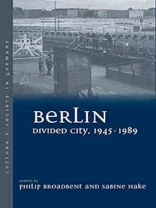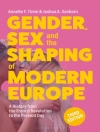A great deal of attention continues to focus on Berlin’s cultural and political landscape after the fall of the Berlin Wall, but as yet, no single volume looks at the divided city through an interdisciplinary analysis. This volume examines how the city was conceived, perceived, and represented during the four decades preceding reunification and thereby offers a unique perspective on divided Berlin’s identities. German historians, art historians, architectural historians, and literary and cultural studies scholars explore the divisions and antagonisms that defined East and West Berlin; and by tracing the little studied similarities and extensive exchanges that occurred despite the presence of the Berlin Wall, they present an indispensible study on the politics and culture of the Cold War.
Table of Content
List of Illustrations
Acknowledgments
Introduction
Philip Broadbent and Sabine Hake
PART I: COLD WAR BEGINNINGS
Chapter 1. Life Among the Ruins: Sex, Space, and Subculture in Zero Hour Berlin
Jennifer Evans
Chapter 2. The Propagandistic Role of Modern Art in Postwar Berlin
Maike Steinkamp
Chapter 3. Back to the Future: New Music’s Revival and Redefinition in Occupied Berlin
Elizabeth Janik
Chapter 4. The Nylon Curtain: Architectural Unification in Divided Berlin
Greg Castillo
Chapter 5. Mediascape and Soundscape: Two Landscapes of Modernity in Cold War Berlin
Heiner Stahl
PART II: EAST BERLIN, THE SOCIALIST CAPITAL
Chapter 6. Painting the Berlin Wall in Leipzig: The Politics of Art in 1960s East Germany
April Eisman
Chapter 7. “You Have to Draw a Line Somewhere”: Tropes of Division in DEFA Films from the early 1960s
Mariana Ivanova
Chapter 8. Building the East German Television Tower
Heather Gumbert
Chapter 9. Transparency in Divided Berlin: The Palace of the Republic
Deborah Ascher Barnstone
PART III: WEST BERLIN, SHOWCASE OF THE WEST
Chapter 10. “I Still Have a Suitcase in Berlin”: Hildegard Knef’s Cold War Movies
Ulrich Bach
Chapter 11. Benno Ohnesorg, Rudi Dutschke, and the Student Movement in West Berlin: Critical Reflections after Forty Years
David Barclay
Chapter 12. Berlin and Post-Meinhof Feminism: Yvonne Rainer’s Journeys from Berlin/1971
Claudia Mesch
Chapter 13. Daniel Libeskind’s Jewish Museum in Berlin as a Cold War Project
Paul Jaskot
Chapter 14. Beyond the Berlin Myth: the Local, the Global and IBA 87
Emily Pugh
PART IV: BERLIN AFTER UNIFICATION: LOOKING BACK AND BEYOND
Chapter 15. Stereographic City: Berlin Photography in the Wende Era
Miriam Paeslack
Chapter 16. Divided City, Divided Heaven? Berlin Border Crossings in Post-Wende Fiction
Lyn Marven
Chapter 17. Interview with Barbara Hoidn
Notes on Contributors
Index
About the author
Sabine Hake is the Texas Chair of German Literature and Culture in the Department of Germanic Studies at the University of Texas at Austin. She is the author of six books, including Topographies of Class: Modern Architecture and Mass Society in Weimar Berlin (2008) and Screen Nazis: Cinema, History, and Democracy (2012), and has published numerous articles and edited volumes on German film and Weimar culture.












